455Z0015: Law of the European Union Assignment, Summer 2019
VerifiedAdded on 2023/01/23
|10
|2667
|52
Homework Assignment
AI Summary
This document presents a comprehensive solution to a Law of the European Union assignment, addressing key concepts such as direct applicability, direct effect (including horizontal and vertical effects), state liability, and the doctrine of indirect effect. The assignment analyzes the legal actions available to individuals and the European Commission when a member state fails to implement an EU directive, specifically Directive 2017/643 E.C. It explores the rights of free movement as per Article 21(1) TFEU, residency rights, and the application of EU law in relation to employment and student status. The solution examines the conditions for permanent residency and family allowances within the context of EU law, referencing relevant case law and directives, including Directive 2004/38. The assignment covers scenarios involving the rights of EU citizens to seek employment and receive unemployment benefits in other member states and the conditions for students to study abroad and receive financial support.
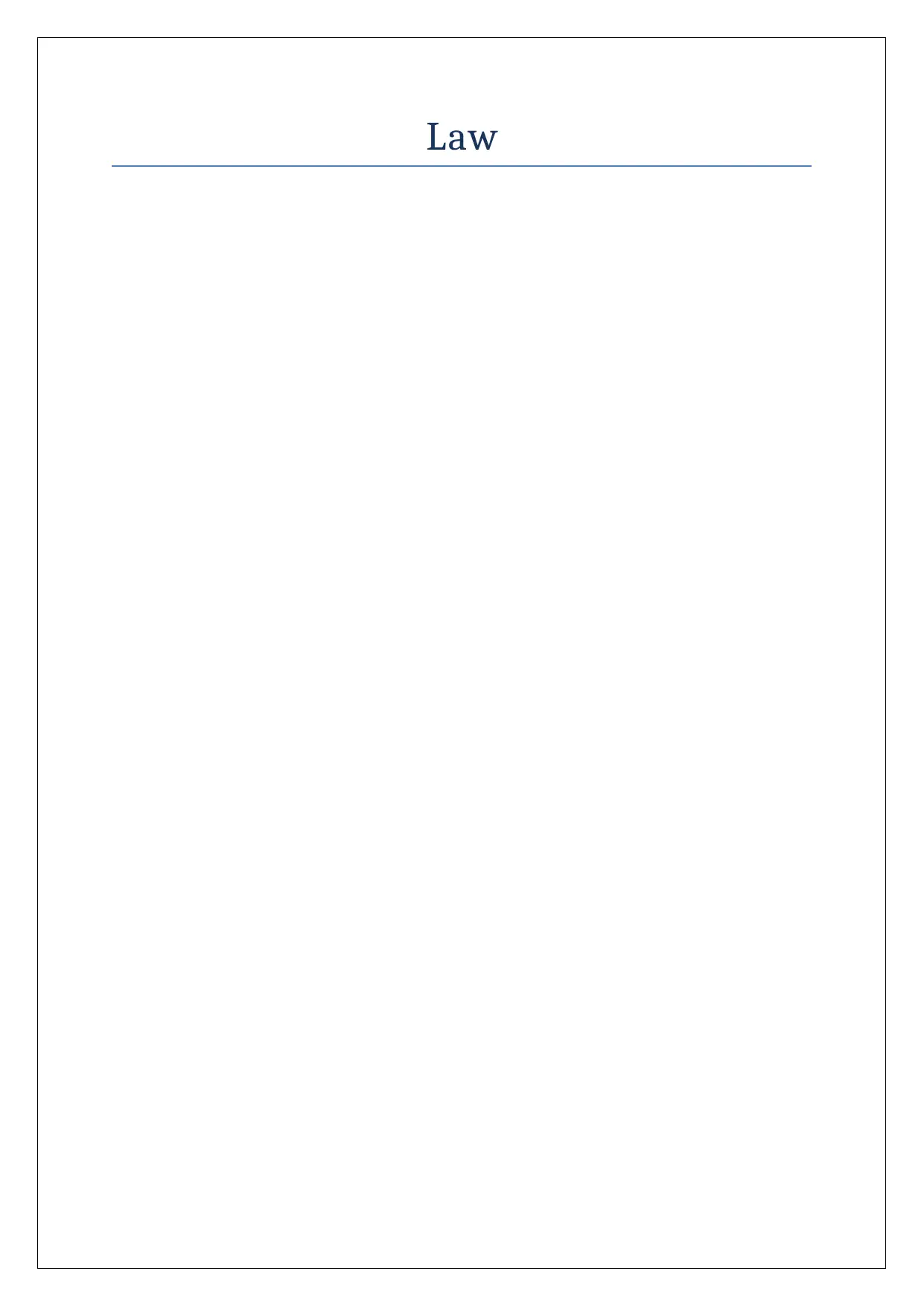
Law
Paraphrase This Document
Need a fresh take? Get an instant paraphrase of this document with our AI Paraphraser

Table of Contents
Section A....................................................................................................................................2
Question 1...............................................................................................................................2
Section 2.....................................................................................................................................3
Question 5...............................................................................................................................3
1
Section A....................................................................................................................................2
Question 1...............................................................................................................................2
Section 2.....................................................................................................................................3
Question 5...............................................................................................................................3
1
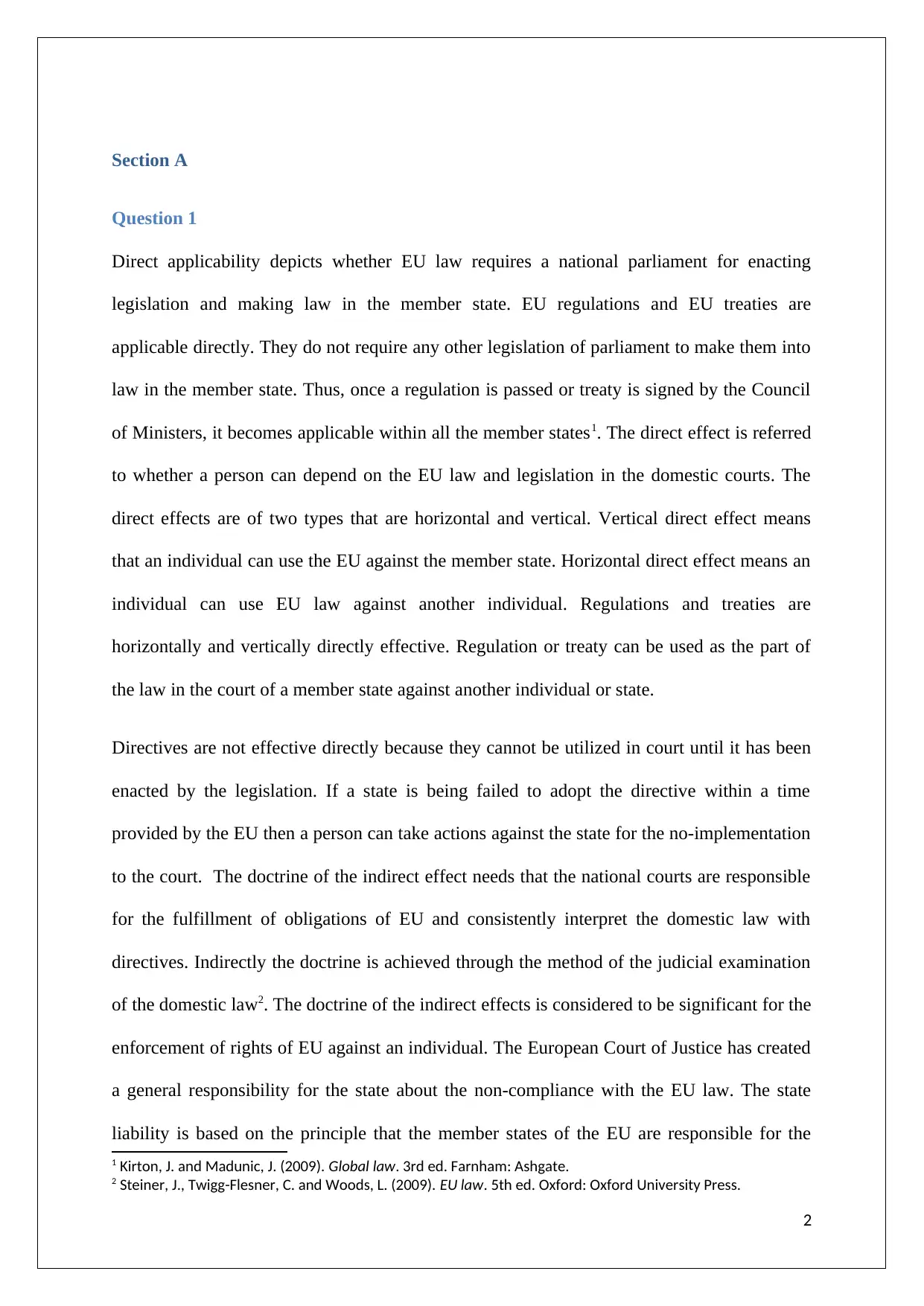
Section A
Question 1
Direct applicability depicts whether EU law requires a national parliament for enacting
legislation and making law in the member state. EU regulations and EU treaties are
applicable directly. They do not require any other legislation of parliament to make them into
law in the member state. Thus, once a regulation is passed or treaty is signed by the Council
of Ministers, it becomes applicable within all the member states1. The direct effect is referred
to whether a person can depend on the EU law and legislation in the domestic courts. The
direct effects are of two types that are horizontal and vertical. Vertical direct effect means
that an individual can use the EU against the member state. Horizontal direct effect means an
individual can use EU law against another individual. Regulations and treaties are
horizontally and vertically directly effective. Regulation or treaty can be used as the part of
the law in the court of a member state against another individual or state.
Directives are not effective directly because they cannot be utilized in court until it has been
enacted by the legislation. If a state is being failed to adopt the directive within a time
provided by the EU then a person can take actions against the state for the no-implementation
to the court. The doctrine of the indirect effect needs that the national courts are responsible
for the fulfillment of obligations of EU and consistently interpret the domestic law with
directives. Indirectly the doctrine is achieved through the method of the judicial examination
of the domestic law2. The doctrine of the indirect effects is considered to be significant for the
enforcement of rights of EU against an individual. The European Court of Justice has created
a general responsibility for the state about the non-compliance with the EU law. The state
liability is based on the principle that the member states of the EU are responsible for the
1 Kirton, J. and Madunic, J. (2009). Global law. 3rd ed. Farnham: Ashgate.
2 Steiner, J., Twigg-Flesner, C. and Woods, L. (2009). EU law. 5th ed. Oxford: Oxford University Press.
2
Question 1
Direct applicability depicts whether EU law requires a national parliament for enacting
legislation and making law in the member state. EU regulations and EU treaties are
applicable directly. They do not require any other legislation of parliament to make them into
law in the member state. Thus, once a regulation is passed or treaty is signed by the Council
of Ministers, it becomes applicable within all the member states1. The direct effect is referred
to whether a person can depend on the EU law and legislation in the domestic courts. The
direct effects are of two types that are horizontal and vertical. Vertical direct effect means
that an individual can use the EU against the member state. Horizontal direct effect means an
individual can use EU law against another individual. Regulations and treaties are
horizontally and vertically directly effective. Regulation or treaty can be used as the part of
the law in the court of a member state against another individual or state.
Directives are not effective directly because they cannot be utilized in court until it has been
enacted by the legislation. If a state is being failed to adopt the directive within a time
provided by the EU then a person can take actions against the state for the no-implementation
to the court. The doctrine of the indirect effect needs that the national courts are responsible
for the fulfillment of obligations of EU and consistently interpret the domestic law with
directives. Indirectly the doctrine is achieved through the method of the judicial examination
of the domestic law2. The doctrine of the indirect effects is considered to be significant for the
enforcement of rights of EU against an individual. The European Court of Justice has created
a general responsibility for the state about the non-compliance with the EU law. The state
liability is based on the principle that the member states of the EU are responsible for the
1 Kirton, J. and Madunic, J. (2009). Global law. 3rd ed. Farnham: Ashgate.
2 Steiner, J., Twigg-Flesner, C. and Woods, L. (2009). EU law. 5th ed. Oxford: Oxford University Press.
2
⊘ This is a preview!⊘
Do you want full access?
Subscribe today to unlock all pages.

Trusted by 1+ million students worldwide
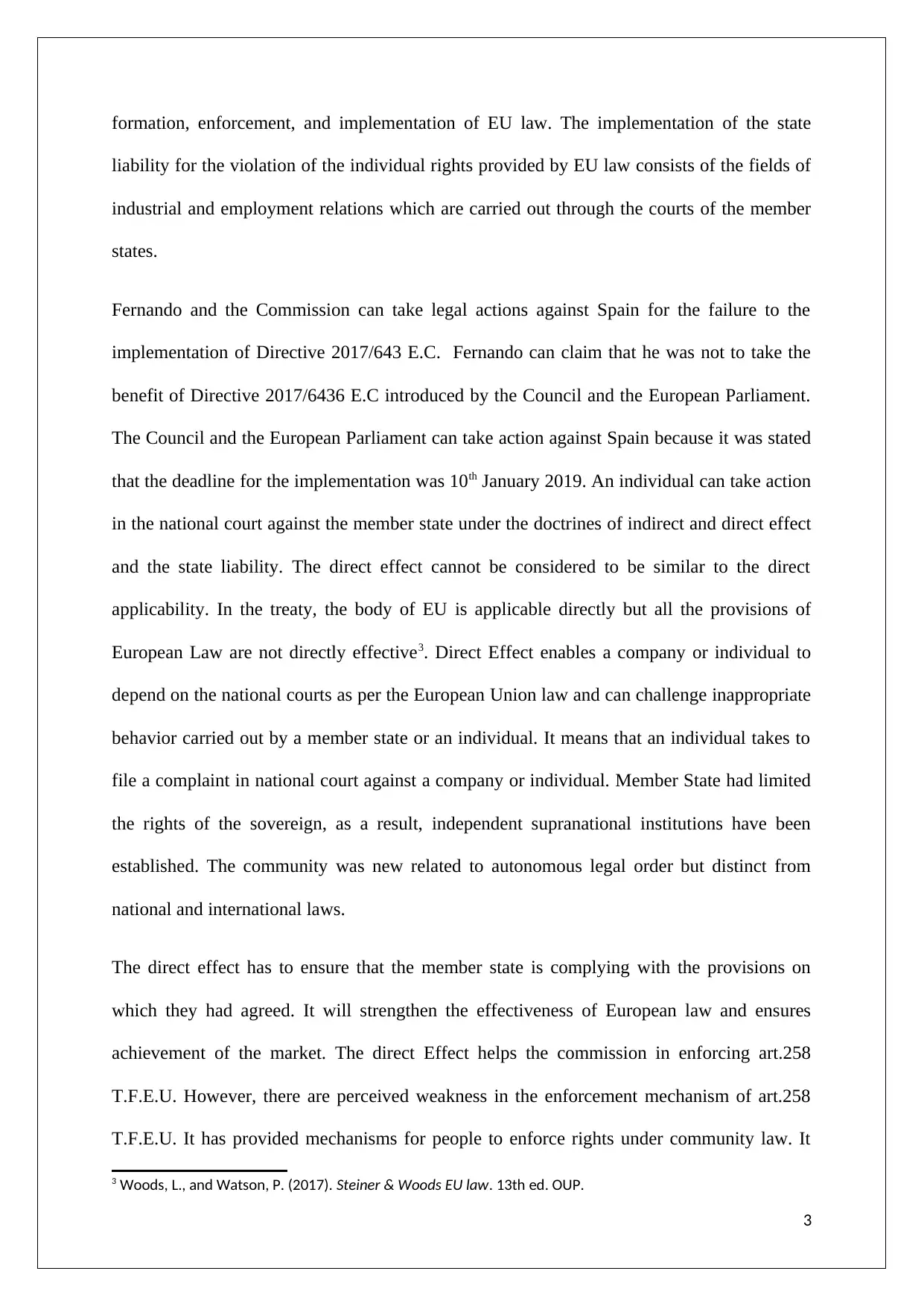
formation, enforcement, and implementation of EU law. The implementation of the state
liability for the violation of the individual rights provided by EU law consists of the fields of
industrial and employment relations which are carried out through the courts of the member
states.
Fernando and the Commission can take legal actions against Spain for the failure to the
implementation of Directive 2017/643 E.C. Fernando can claim that he was not to take the
benefit of Directive 2017/6436 E.C introduced by the Council and the European Parliament.
The Council and the European Parliament can take action against Spain because it was stated
that the deadline for the implementation was 10th January 2019. An individual can take action
in the national court against the member state under the doctrines of indirect and direct effect
and the state liability. The direct effect cannot be considered to be similar to the direct
applicability. In the treaty, the body of EU is applicable directly but all the provisions of
European Law are not directly effective3. Direct Effect enables a company or individual to
depend on the national courts as per the European Union law and can challenge inappropriate
behavior carried out by a member state or an individual. It means that an individual takes to
file a complaint in national court against a company or individual. Member State had limited
the rights of the sovereign, as a result, independent supranational institutions have been
established. The community was new related to autonomous legal order but distinct from
national and international laws.
The direct effect has to ensure that the member state is complying with the provisions on
which they had agreed. It will strengthen the effectiveness of European law and ensures
achievement of the market. The direct Effect helps the commission in enforcing art.258
T.F.E.U. However, there are perceived weakness in the enforcement mechanism of art.258
T.F.E.U. It has provided mechanisms for people to enforce rights under community law. It
3 Woods, L., and Watson, P. (2017). Steiner & Woods EU law. 13th ed. OUP.
3
liability for the violation of the individual rights provided by EU law consists of the fields of
industrial and employment relations which are carried out through the courts of the member
states.
Fernando and the Commission can take legal actions against Spain for the failure to the
implementation of Directive 2017/643 E.C. Fernando can claim that he was not to take the
benefit of Directive 2017/6436 E.C introduced by the Council and the European Parliament.
The Council and the European Parliament can take action against Spain because it was stated
that the deadline for the implementation was 10th January 2019. An individual can take action
in the national court against the member state under the doctrines of indirect and direct effect
and the state liability. The direct effect cannot be considered to be similar to the direct
applicability. In the treaty, the body of EU is applicable directly but all the provisions of
European Law are not directly effective3. Direct Effect enables a company or individual to
depend on the national courts as per the European Union law and can challenge inappropriate
behavior carried out by a member state or an individual. It means that an individual takes to
file a complaint in national court against a company or individual. Member State had limited
the rights of the sovereign, as a result, independent supranational institutions have been
established. The community was new related to autonomous legal order but distinct from
national and international laws.
The direct effect has to ensure that the member state is complying with the provisions on
which they had agreed. It will strengthen the effectiveness of European law and ensures
achievement of the market. The direct Effect helps the commission in enforcing art.258
T.F.E.U. However, there are perceived weakness in the enforcement mechanism of art.258
T.F.E.U. It has provided mechanisms for people to enforce rights under community law. It
3 Woods, L., and Watson, P. (2017). Steiner & Woods EU law. 13th ed. OUP.
3
Paraphrase This Document
Need a fresh take? Get an instant paraphrase of this document with our AI Paraphraser
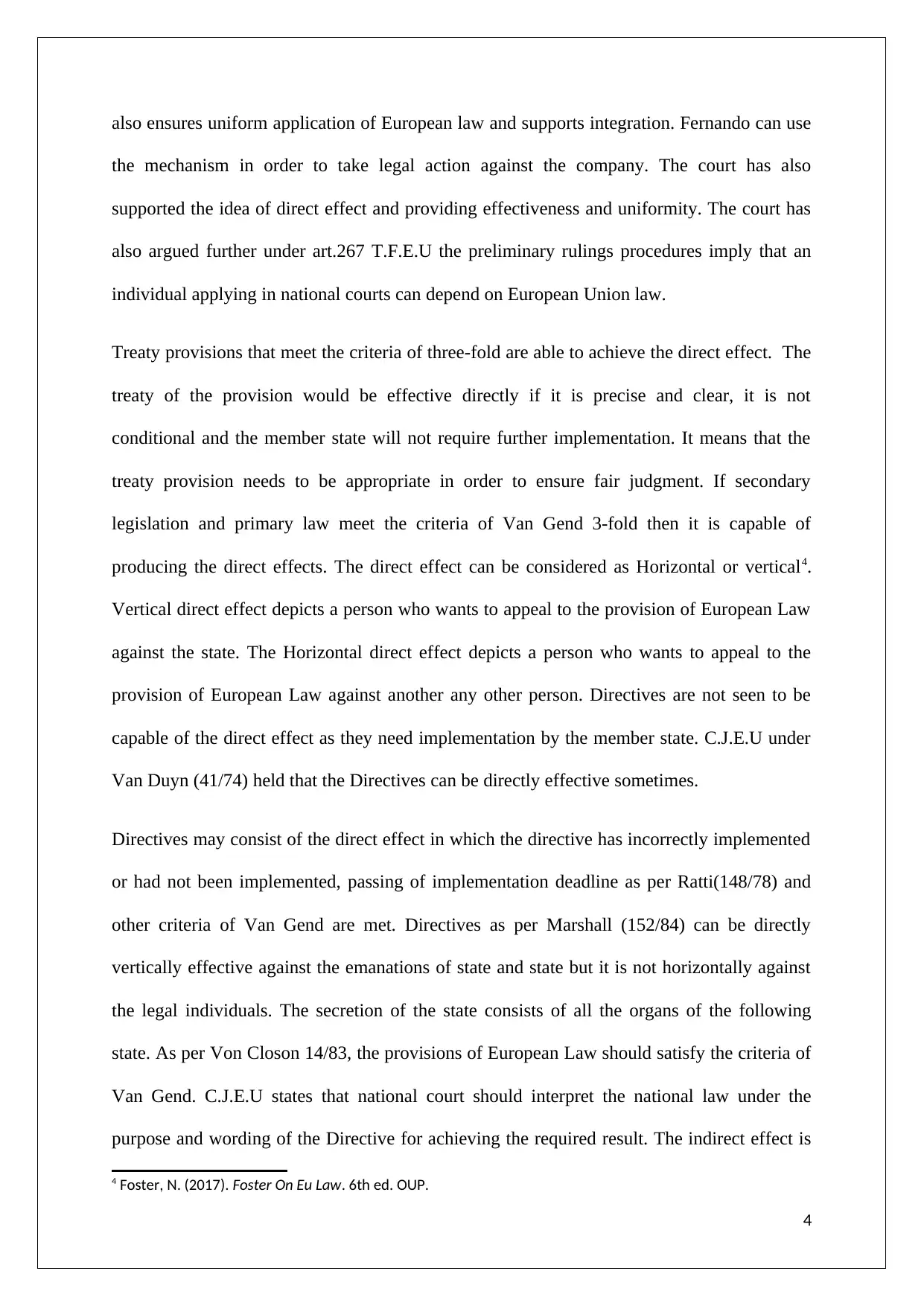
also ensures uniform application of European law and supports integration. Fernando can use
the mechanism in order to take legal action against the company. The court has also
supported the idea of direct effect and providing effectiveness and uniformity. The court has
also argued further under art.267 T.F.E.U the preliminary rulings procedures imply that an
individual applying in national courts can depend on European Union law.
Treaty provisions that meet the criteria of three-fold are able to achieve the direct effect. The
treaty of the provision would be effective directly if it is precise and clear, it is not
conditional and the member state will not require further implementation. It means that the
treaty provision needs to be appropriate in order to ensure fair judgment. If secondary
legislation and primary law meet the criteria of Van Gend 3-fold then it is capable of
producing the direct effects. The direct effect can be considered as Horizontal or vertical4.
Vertical direct effect depicts a person who wants to appeal to the provision of European Law
against the state. The Horizontal direct effect depicts a person who wants to appeal to the
provision of European Law against another any other person. Directives are not seen to be
capable of the direct effect as they need implementation by the member state. C.J.E.U under
Van Duyn (41/74) held that the Directives can be directly effective sometimes.
Directives may consist of the direct effect in which the directive has incorrectly implemented
or had not been implemented, passing of implementation deadline as per Ratti(148/78) and
other criteria of Van Gend are met. Directives as per Marshall (152/84) can be directly
vertically effective against the emanations of state and state but it is not horizontally against
the legal individuals. The secretion of the state consists of all the organs of the following
state. As per Von Closon 14/83, the provisions of European Law should satisfy the criteria of
Van Gend. C.J.E.U states that national court should interpret the national law under the
purpose and wording of the Directive for achieving the required result. The indirect effect is
4 Foster, N. (2017). Foster On Eu Law. 6th ed. OUP.
4
the mechanism in order to take legal action against the company. The court has also
supported the idea of direct effect and providing effectiveness and uniformity. The court has
also argued further under art.267 T.F.E.U the preliminary rulings procedures imply that an
individual applying in national courts can depend on European Union law.
Treaty provisions that meet the criteria of three-fold are able to achieve the direct effect. The
treaty of the provision would be effective directly if it is precise and clear, it is not
conditional and the member state will not require further implementation. It means that the
treaty provision needs to be appropriate in order to ensure fair judgment. If secondary
legislation and primary law meet the criteria of Van Gend 3-fold then it is capable of
producing the direct effects. The direct effect can be considered as Horizontal or vertical4.
Vertical direct effect depicts a person who wants to appeal to the provision of European Law
against the state. The Horizontal direct effect depicts a person who wants to appeal to the
provision of European Law against another any other person. Directives are not seen to be
capable of the direct effect as they need implementation by the member state. C.J.E.U under
Van Duyn (41/74) held that the Directives can be directly effective sometimes.
Directives may consist of the direct effect in which the directive has incorrectly implemented
or had not been implemented, passing of implementation deadline as per Ratti(148/78) and
other criteria of Van Gend are met. Directives as per Marshall (152/84) can be directly
vertically effective against the emanations of state and state but it is not horizontally against
the legal individuals. The secretion of the state consists of all the organs of the following
state. As per Von Closon 14/83, the provisions of European Law should satisfy the criteria of
Van Gend. C.J.E.U states that national court should interpret the national law under the
purpose and wording of the Directive for achieving the required result. The indirect effect is
4 Foster, N. (2017). Foster On Eu Law. 6th ed. OUP.
4
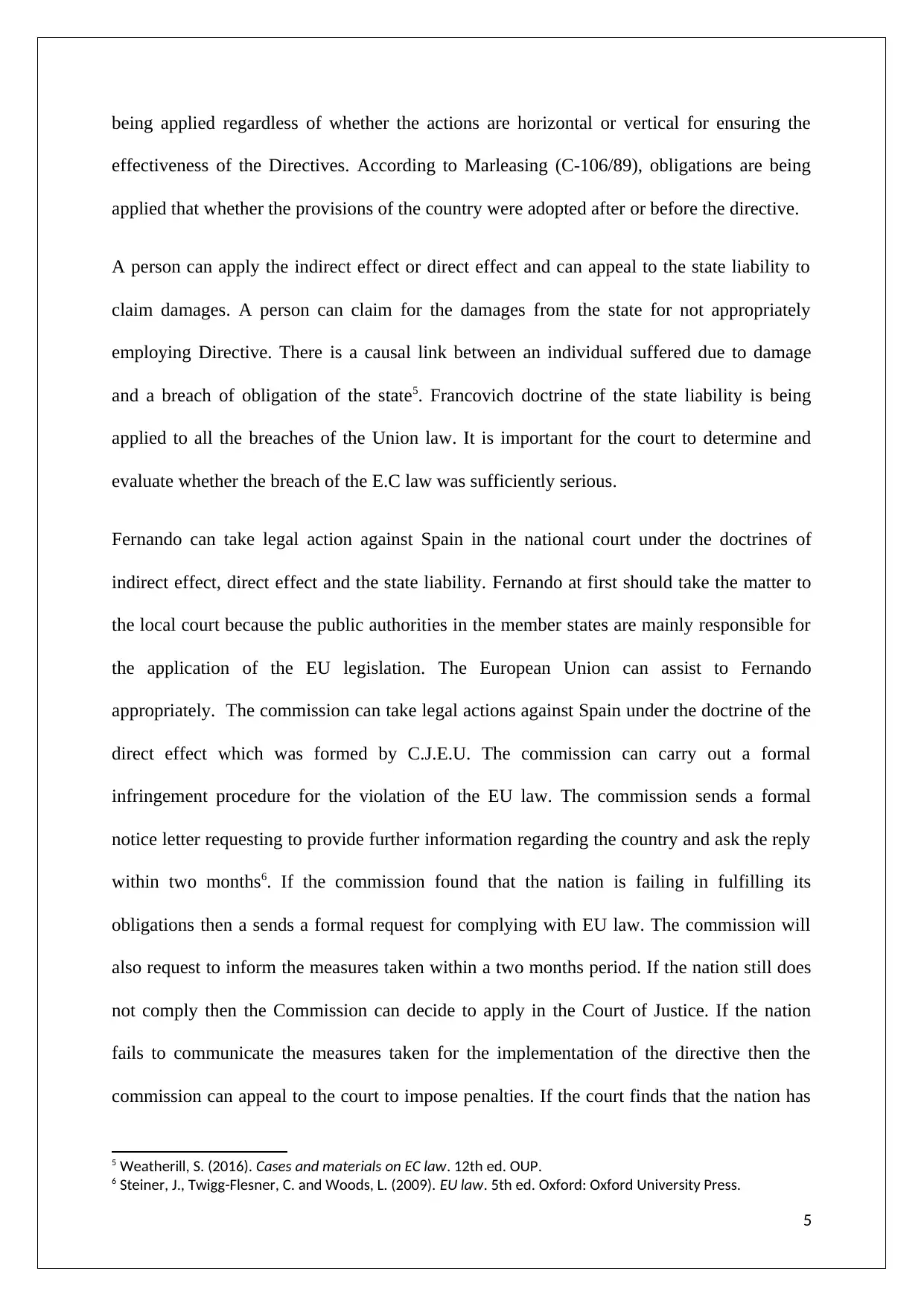
being applied regardless of whether the actions are horizontal or vertical for ensuring the
effectiveness of the Directives. According to Marleasing (C-106/89), obligations are being
applied that whether the provisions of the country were adopted after or before the directive.
A person can apply the indirect effect or direct effect and can appeal to the state liability to
claim damages. A person can claim for the damages from the state for not appropriately
employing Directive. There is a causal link between an individual suffered due to damage
and a breach of obligation of the state5. Francovich doctrine of the state liability is being
applied to all the breaches of the Union law. It is important for the court to determine and
evaluate whether the breach of the E.C law was sufficiently serious.
Fernando can take legal action against Spain in the national court under the doctrines of
indirect effect, direct effect and the state liability. Fernando at first should take the matter to
the local court because the public authorities in the member states are mainly responsible for
the application of the EU legislation. The European Union can assist to Fernando
appropriately. The commission can take legal actions against Spain under the doctrine of the
direct effect which was formed by C.J.E.U. The commission can carry out a formal
infringement procedure for the violation of the EU law. The commission sends a formal
notice letter requesting to provide further information regarding the country and ask the reply
within two months6. If the commission found that the nation is failing in fulfilling its
obligations then a sends a formal request for complying with EU law. The commission will
also request to inform the measures taken within a two months period. If the nation still does
not comply then the Commission can decide to apply in the Court of Justice. If the nation
fails to communicate the measures taken for the implementation of the directive then the
commission can appeal to the court to impose penalties. If the court finds that the nation has
5 Weatherill, S. (2016). Cases and materials on EC law. 12th ed. OUP.
6 Steiner, J., Twigg-Flesner, C. and Woods, L. (2009). EU law. 5th ed. Oxford: Oxford University Press.
5
effectiveness of the Directives. According to Marleasing (C-106/89), obligations are being
applied that whether the provisions of the country were adopted after or before the directive.
A person can apply the indirect effect or direct effect and can appeal to the state liability to
claim damages. A person can claim for the damages from the state for not appropriately
employing Directive. There is a causal link between an individual suffered due to damage
and a breach of obligation of the state5. Francovich doctrine of the state liability is being
applied to all the breaches of the Union law. It is important for the court to determine and
evaluate whether the breach of the E.C law was sufficiently serious.
Fernando can take legal action against Spain in the national court under the doctrines of
indirect effect, direct effect and the state liability. Fernando at first should take the matter to
the local court because the public authorities in the member states are mainly responsible for
the application of the EU legislation. The European Union can assist to Fernando
appropriately. The commission can take legal actions against Spain under the doctrine of the
direct effect which was formed by C.J.E.U. The commission can carry out a formal
infringement procedure for the violation of the EU law. The commission sends a formal
notice letter requesting to provide further information regarding the country and ask the reply
within two months6. If the commission found that the nation is failing in fulfilling its
obligations then a sends a formal request for complying with EU law. The commission will
also request to inform the measures taken within a two months period. If the nation still does
not comply then the Commission can decide to apply in the Court of Justice. If the nation
fails to communicate the measures taken for the implementation of the directive then the
commission can appeal to the court to impose penalties. If the court finds that the nation has
5 Weatherill, S. (2016). Cases and materials on EC law. 12th ed. OUP.
6 Steiner, J., Twigg-Flesner, C. and Woods, L. (2009). EU law. 5th ed. Oxford: Oxford University Press.
5
⊘ This is a preview!⊘
Do you want full access?
Subscribe today to unlock all pages.

Trusted by 1+ million students worldwide
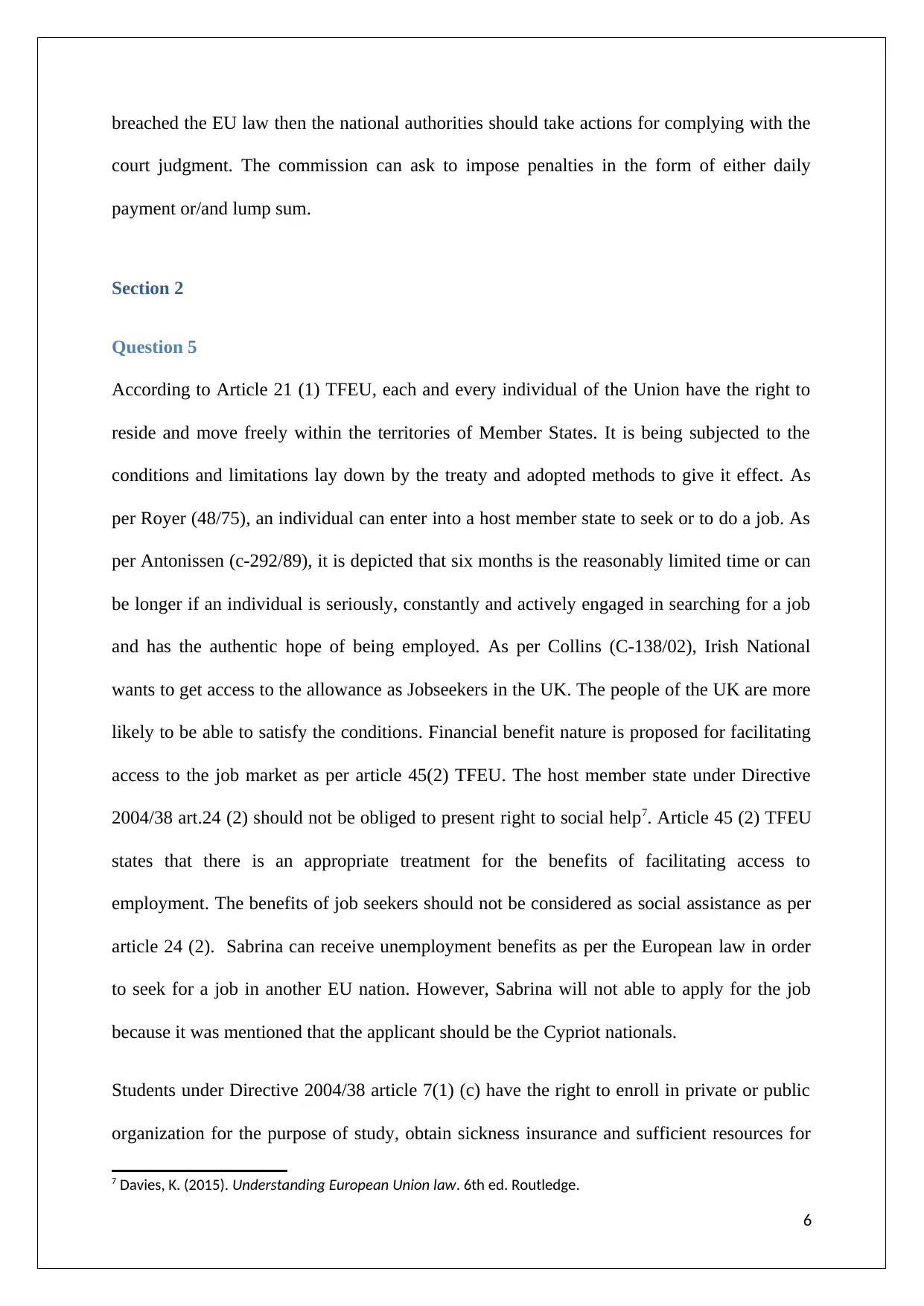
breached the EU law then the national authorities should take actions for complying with the
court judgment. The commission can ask to impose penalties in the form of either daily
payment or/and lump sum.
Section 2
Question 5
According to Article 21 (1) TFEU, each and every individual of the Union have the right to
reside and move freely within the territories of Member States. It is being subjected to the
conditions and limitations lay down by the treaty and adopted methods to give it effect. As
per Royer (48/75), an individual can enter into a host member state to seek or to do a job. As
per Antonissen (c-292/89), it is depicted that six months is the reasonably limited time or can
be longer if an individual is seriously, constantly and actively engaged in searching for a job
and has the authentic hope of being employed. As per Collins (C-138/02), Irish National
wants to get access to the allowance as Jobseekers in the UK. The people of the UK are more
likely to be able to satisfy the conditions. Financial benefit nature is proposed for facilitating
access to the job market as per article 45(2) TFEU. The host member state under Directive
2004/38 art.24 (2) should not be obliged to present right to social help7. Article 45 (2) TFEU
states that there is an appropriate treatment for the benefits of facilitating access to
employment. The benefits of job seekers should not be considered as social assistance as per
article 24 (2). Sabrina can receive unemployment benefits as per the European law in order
to seek for a job in another EU nation. However, Sabrina will not able to apply for the job
because it was mentioned that the applicant should be the Cypriot nationals.
Students under Directive 2004/38 article 7(1) (c) have the right to enroll in private or public
organization for the purpose of study, obtain sickness insurance and sufficient resources for
7 Davies, K. (2015). Understanding European Union law. 6th ed. Routledge.
6
court judgment. The commission can ask to impose penalties in the form of either daily
payment or/and lump sum.
Section 2
Question 5
According to Article 21 (1) TFEU, each and every individual of the Union have the right to
reside and move freely within the territories of Member States. It is being subjected to the
conditions and limitations lay down by the treaty and adopted methods to give it effect. As
per Royer (48/75), an individual can enter into a host member state to seek or to do a job. As
per Antonissen (c-292/89), it is depicted that six months is the reasonably limited time or can
be longer if an individual is seriously, constantly and actively engaged in searching for a job
and has the authentic hope of being employed. As per Collins (C-138/02), Irish National
wants to get access to the allowance as Jobseekers in the UK. The people of the UK are more
likely to be able to satisfy the conditions. Financial benefit nature is proposed for facilitating
access to the job market as per article 45(2) TFEU. The host member state under Directive
2004/38 art.24 (2) should not be obliged to present right to social help7. Article 45 (2) TFEU
states that there is an appropriate treatment for the benefits of facilitating access to
employment. The benefits of job seekers should not be considered as social assistance as per
article 24 (2). Sabrina can receive unemployment benefits as per the European law in order
to seek for a job in another EU nation. However, Sabrina will not able to apply for the job
because it was mentioned that the applicant should be the Cypriot nationals.
Students under Directive 2004/38 article 7(1) (c) have the right to enroll in private or public
organization for the purpose of study, obtain sickness insurance and sufficient resources for
7 Davies, K. (2015). Understanding European Union law. 6th ed. Routledge.
6
Paraphrase This Document
Need a fresh take? Get an instant paraphrase of this document with our AI Paraphraser
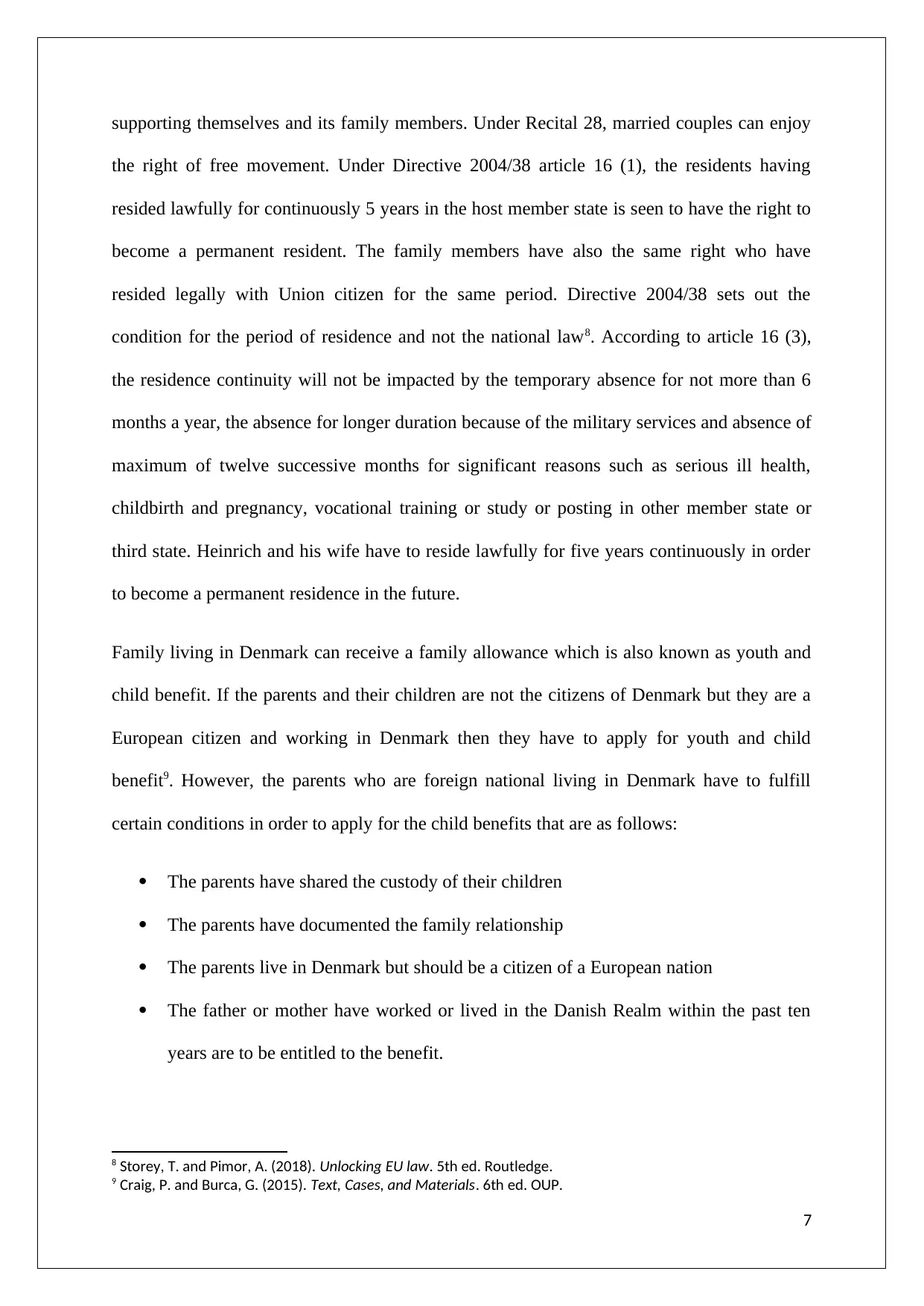
supporting themselves and its family members. Under Recital 28, married couples can enjoy
the right of free movement. Under Directive 2004/38 article 16 (1), the residents having
resided lawfully for continuously 5 years in the host member state is seen to have the right to
become a permanent resident. The family members have also the same right who have
resided legally with Union citizen for the same period. Directive 2004/38 sets out the
condition for the period of residence and not the national law8. According to article 16 (3),
the residence continuity will not be impacted by the temporary absence for not more than 6
months a year, the absence for longer duration because of the military services and absence of
maximum of twelve successive months for significant reasons such as serious ill health,
childbirth and pregnancy, vocational training or study or posting in other member state or
third state. Heinrich and his wife have to reside lawfully for five years continuously in order
to become a permanent residence in the future.
Family living in Denmark can receive a family allowance which is also known as youth and
child benefit. If the parents and their children are not the citizens of Denmark but they are a
European citizen and working in Denmark then they have to apply for youth and child
benefit9. However, the parents who are foreign national living in Denmark have to fulfill
certain conditions in order to apply for the child benefits that are as follows:
The parents have shared the custody of their children
The parents have documented the family relationship
The parents live in Denmark but should be a citizen of a European nation
The father or mother have worked or lived in the Danish Realm within the past ten
years are to be entitled to the benefit.
8 Storey, T. and Pimor, A. (2018). Unlocking EU law. 5th ed. Routledge.
9 Craig, P. and Burca, G. (2015). Text, Cases, and Materials. 6th ed. OUP.
7
the right of free movement. Under Directive 2004/38 article 16 (1), the residents having
resided lawfully for continuously 5 years in the host member state is seen to have the right to
become a permanent resident. The family members have also the same right who have
resided legally with Union citizen for the same period. Directive 2004/38 sets out the
condition for the period of residence and not the national law8. According to article 16 (3),
the residence continuity will not be impacted by the temporary absence for not more than 6
months a year, the absence for longer duration because of the military services and absence of
maximum of twelve successive months for significant reasons such as serious ill health,
childbirth and pregnancy, vocational training or study or posting in other member state or
third state. Heinrich and his wife have to reside lawfully for five years continuously in order
to become a permanent residence in the future.
Family living in Denmark can receive a family allowance which is also known as youth and
child benefit. If the parents and their children are not the citizens of Denmark but they are a
European citizen and working in Denmark then they have to apply for youth and child
benefit9. However, the parents who are foreign national living in Denmark have to fulfill
certain conditions in order to apply for the child benefits that are as follows:
The parents have shared the custody of their children
The parents have documented the family relationship
The parents live in Denmark but should be a citizen of a European nation
The father or mother have worked or lived in the Danish Realm within the past ten
years are to be entitled to the benefit.
8 Storey, T. and Pimor, A. (2018). Unlocking EU law. 5th ed. Routledge.
9 Craig, P. and Burca, G. (2015). Text, Cases, and Materials. 6th ed. OUP.
7
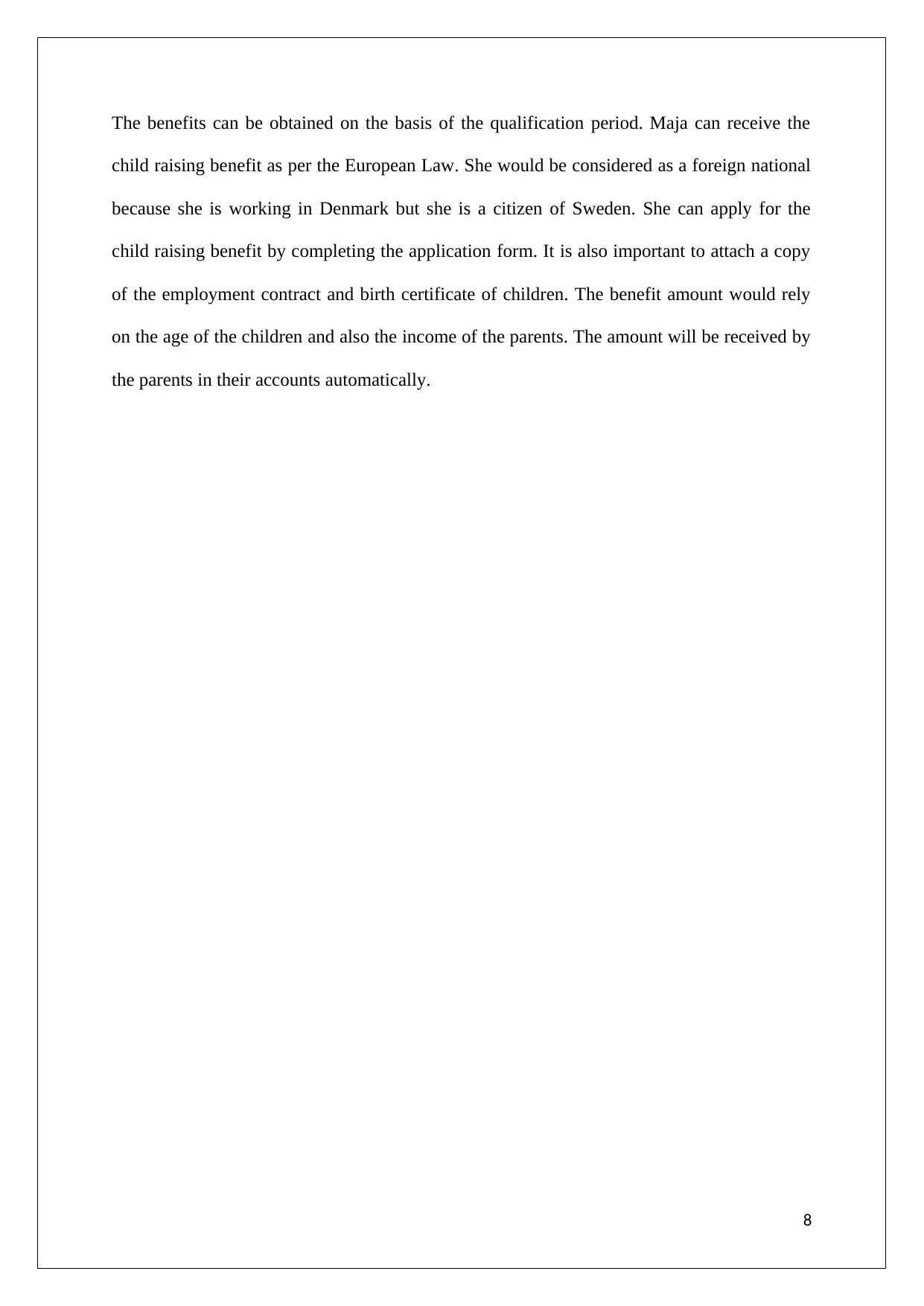
The benefits can be obtained on the basis of the qualification period. Maja can receive the
child raising benefit as per the European Law. She would be considered as a foreign national
because she is working in Denmark but she is a citizen of Sweden. She can apply for the
child raising benefit by completing the application form. It is also important to attach a copy
of the employment contract and birth certificate of children. The benefit amount would rely
on the age of the children and also the income of the parents. The amount will be received by
the parents in their accounts automatically.
8
child raising benefit as per the European Law. She would be considered as a foreign national
because she is working in Denmark but she is a citizen of Sweden. She can apply for the
child raising benefit by completing the application form. It is also important to attach a copy
of the employment contract and birth certificate of children. The benefit amount would rely
on the age of the children and also the income of the parents. The amount will be received by
the parents in their accounts automatically.
8
⊘ This is a preview!⊘
Do you want full access?
Subscribe today to unlock all pages.

Trusted by 1+ million students worldwide
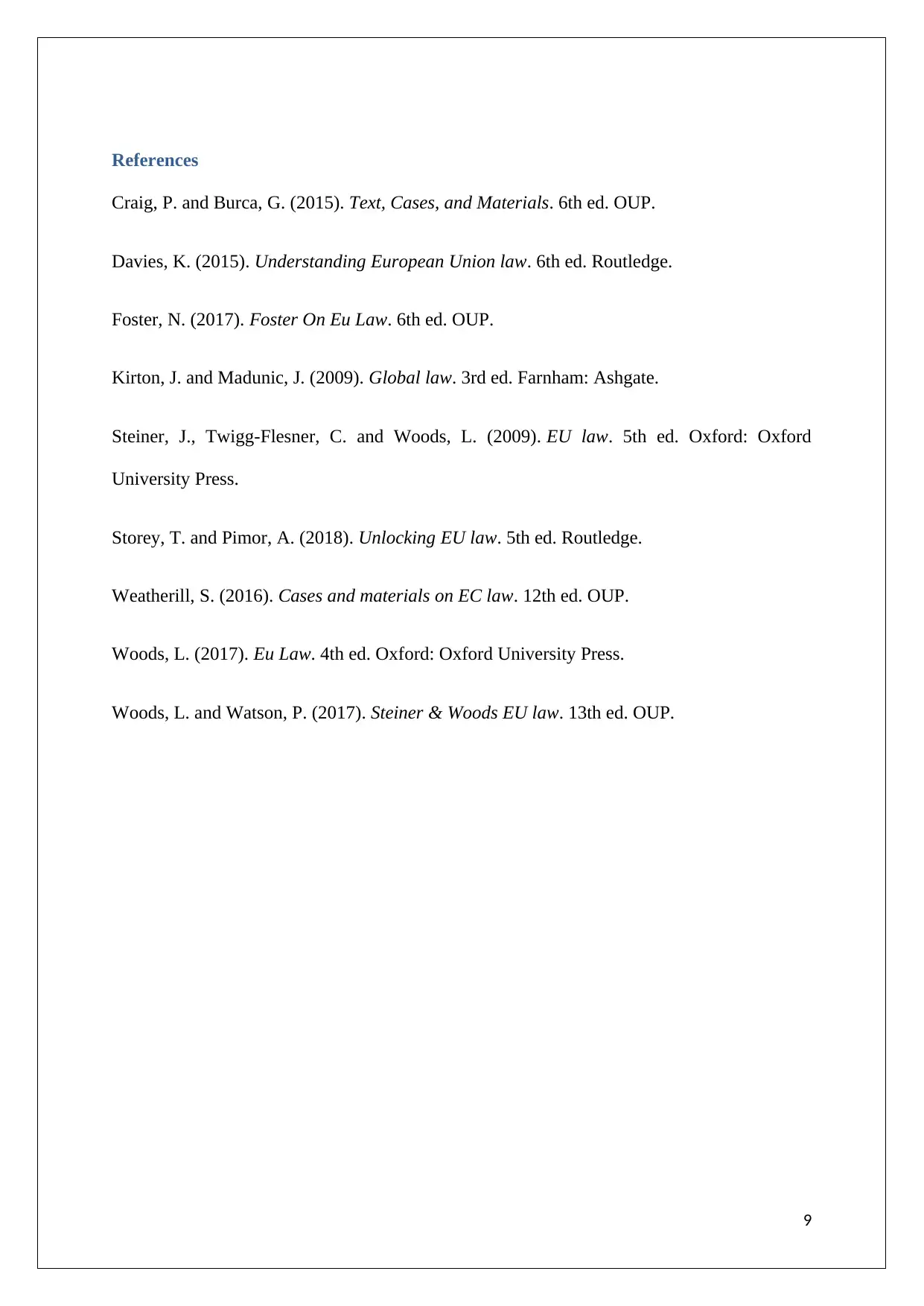
References
Craig, P. and Burca, G. (2015). Text, Cases, and Materials. 6th ed. OUP.
Davies, K. (2015). Understanding European Union law. 6th ed. Routledge.
Foster, N. (2017). Foster On Eu Law. 6th ed. OUP.
Kirton, J. and Madunic, J. (2009). Global law. 3rd ed. Farnham: Ashgate.
Steiner, J., Twigg-Flesner, C. and Woods, L. (2009). EU law. 5th ed. Oxford: Oxford
University Press.
Storey, T. and Pimor, A. (2018). Unlocking EU law. 5th ed. Routledge.
Weatherill, S. (2016). Cases and materials on EC law. 12th ed. OUP.
Woods, L. (2017). Eu Law. 4th ed. Oxford: Oxford University Press.
Woods, L. and Watson, P. (2017). Steiner & Woods EU law. 13th ed. OUP.
9
Craig, P. and Burca, G. (2015). Text, Cases, and Materials. 6th ed. OUP.
Davies, K. (2015). Understanding European Union law. 6th ed. Routledge.
Foster, N. (2017). Foster On Eu Law. 6th ed. OUP.
Kirton, J. and Madunic, J. (2009). Global law. 3rd ed. Farnham: Ashgate.
Steiner, J., Twigg-Flesner, C. and Woods, L. (2009). EU law. 5th ed. Oxford: Oxford
University Press.
Storey, T. and Pimor, A. (2018). Unlocking EU law. 5th ed. Routledge.
Weatherill, S. (2016). Cases and materials on EC law. 12th ed. OUP.
Woods, L. (2017). Eu Law. 4th ed. Oxford: Oxford University Press.
Woods, L. and Watson, P. (2017). Steiner & Woods EU law. 13th ed. OUP.
9
1 out of 10
Related Documents
Your All-in-One AI-Powered Toolkit for Academic Success.
+13062052269
info@desklib.com
Available 24*7 on WhatsApp / Email
![[object Object]](/_next/static/media/star-bottom.7253800d.svg)
Unlock your academic potential
Copyright © 2020–2026 A2Z Services. All Rights Reserved. Developed and managed by ZUCOL.





